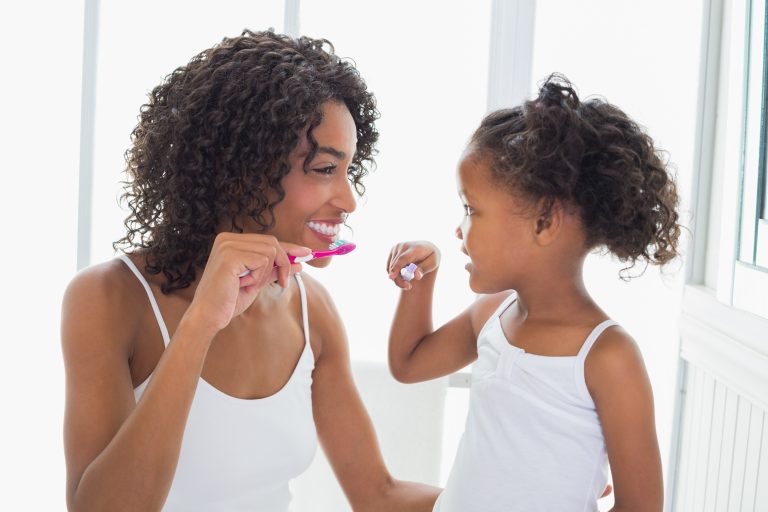
The Impact of Pediatric Dentistry
Our aim is to lay a strong foundation with pediatric dental care that’s welcoming for children, fostering a healthy rapport between our dental team and our young clients. This approach encourages children to play an active role in their oral hygiene, promoting a sense of responsibility and excitement about caring for their teeth. Establishing these positive habits early on prepares them for a lifetime of dental visits that they’ll be enthusiastic about.
From their very first check-up, pediatric dental care provides gentle routine cleanings and support at every developmental stage. We take joy in guiding our young patients as they experience the natural progression of their dental health – from the emergence of their first teeth and the loss of baby teeth to the growth of permanent teeth and considerations for orthodontic treatments in their teenage years. We’re here to make every step, including those first fillings and decisions about braces, less daunting and more of a shared, positive journey.
The Importance of Dental Care for Children
Some individuals wonder why going to the dentist is important for kids, especially when baby teeth are going to fall out anyway. By the time kids are 3, they usually have all their baby teeth. These start to fall out around age 6, and by the time they’re teenagers, they mostly have their grown-up teeth, except for wisdom teeth. Taking care of teeth is important while kids are growing up because it affects their oral health later on.
Understanding Dental Discomfort for Children
Just like adults, children can experience dental problems such as cavities, sensitive teeth, infections, and gum issues. Often, it might be difficult for a child to realize that the discomfort they’re experiencing isn’t normal because they have nothing to compare it to, yet they’re feeling the pain all the same. If you notice your child avoiding hot or cold foods, skipping chewy treats, or chewing food on only one side of their mouth, it could be their way of dealing with tooth pain or sensitivity.
Baby Teeth Pave the Way for Adult Teeth
When a baby tooth becomes loose and eventually falls out, its root is absorbed back into the body, leaving a space that serves as a path for the incoming adult tooth. If a baby tooth is removed too early, it may lead to issues such as crowding or misalignment of the permanent teeth. Thus, ensuring that baby teeth, surrounding tissues and gums, remain strong and healthy is crucial for giving adult teeth the best possible head start.
A Foundation for Self-Esteem
Having a complete and healthy set of teeth is vital for children as they master speaking and smiling. From an early age, kids start to develop relationships and social abilities. Experiencing dental issues, pain, or sensitivity can affect their ability to communicate and may influence how they’re seen by friends.
Healthy Eating Habits for Growing Children
Although it can be a daunting task for parents dealing with picky eaters, ensuring children eat a diverse range of foods is crucial for their growth. Dental discomfort and pain can lead children to shy away from foods that are crunchy, chewy, or have a lot of texture. This could result in lifelong habits of chewing on one side, using an incorrect part of the mouth to eat, or showing little interest in eating altogether.
Your Child's First Dental Visit
At our practice, we prioritise the health, comfort, and satisfaction of our patients, regardless of age. In pediatric dentistry, we give extra attention to the unique experiences our littlest patients may encounter. We focus on key aspects of children’s dental health and communicate with them in a manner that’s both engaging and comforting.
Interactive Introduction
Careful Check-up
Communication and Collaboration
Following the examination, we offer advice tailored to our young patients and their caregivers. We might share some helpful strategies for cleaning those difficult-to-reach areas. If we identify any areas of concern, we’ll make sure you’re aware and understand what to keep an eye on between visits. By working together, we ensure the best possible care for your child’s dental health.
Get in Touch Now
To book your first consultation and examination.
During this initial visit, we’ll conduct a thorough review, assessing your teeth, gums, soft tissues, as well as the alignment and condition of your bite. We want to understand the overall health and functionality of your mouth. We’re keen to learn all about your smile, its aesthetics, and most importantly, your personal goals for your dental health and appearance. Let us guide you on the path to achieving your desired smile.
Frequently Asked Questions
Pediatric dentistry refers to the dental specialty focused on the oral health care of children, from infancy to their teenage years. Pediatric dentists are experts trained to address the diverse dental needs and changes that occur in children’s mouths as they transition from baby teeth to adult teeth.
Children typically begin teething around 6 months of age. It’s advised that they have their initial dental visit by their first birthday or within six months after their first tooth appears. If you notice any signs of discomfort, pain, or other dental issues in your child, it’s important to schedule an appointment right away. It’s never too late to bring your child in for their first dental check-up.
Pediatric dentists primarily focus on the dental care of individuals who are minors. Generally, they provide specialized dental services to patients ranging from 6 months old up to 18 years old.
The recommended frequency for dental visits for children, including toddlers, is the same as for adults—typically every 6 months, unless your dentist advises otherwise. Depending on personal dental health needs and financial considerations, some may choose visits every 3 or 8 months. It’s important not to let more than a year pass between check-ups. If your toddler is in any discomfort or pain, schedule an appointment immediately.









